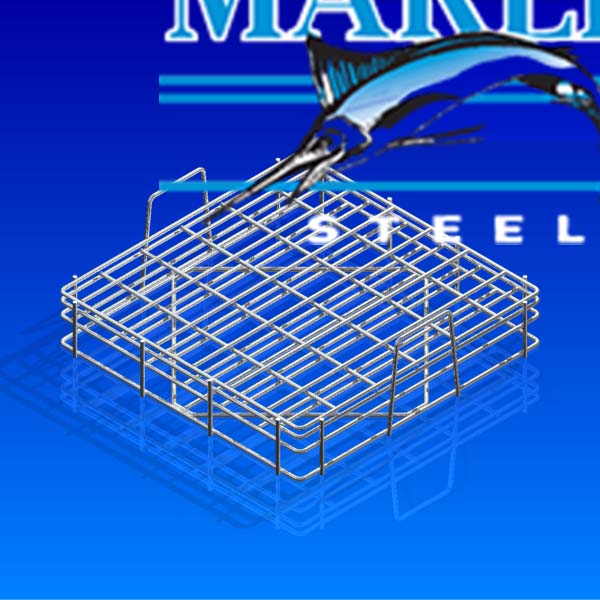 If the American manufacturing sector is to keep growing, manufacturers will need to export their goods to the 95% of the world’s population that lives outside the borders of the United States. Manufacturers who export also tend to offer better pay and benefits to their employees than the industry average—as noted by the National Association of Manufacturers (NAM), “Jobs supported by exports pay, on average, 18 percent more than other jobs.”
If the American manufacturing sector is to keep growing, manufacturers will need to export their goods to the 95% of the world’s population that lives outside the borders of the United States. Manufacturers who export also tend to offer better pay and benefits to their employees than the industry average—as noted by the National Association of Manufacturers (NAM), “Jobs supported by exports pay, on average, 18 percent more than other jobs.”
This is why Marlin Steel is proud to be an active part of the NAM’s efforts to promote the growth of American manufacturing exports—and a company that exports to dozens of countries around the globe!
Recently, a large, prestigious Japanese manufacturer reached out to Marlin Steel to order a set of custom wire baskets for a new parts finishing process they were planning to implement. The system for the baskets had not yet been added to the factory floor, but its specifications were already established and the chemicals to be used chosen.
The Requirements for the Custom Wire Baskets
In the Japanese manufacturer’s planned process, each basket would carry parts through several distinct chemical baths, including:
- Hydrochloric acid
- Hydrofluoric acid
- Nitric acid
- Potassium hydroxide (KOH)-based cleaner
- Ultrasonic rinses using UPW (ultra-pure water)
The sheer strength and variety of acidic and alkali solutions that the process called for demanded an extremely chemical-resistant basket. Also, to prevent the contamination of each bath with chemicals from the previous bath, the baskets would need to be able to drain quickly and completely.
Another challenge of the process is that the parts to be processed were all extremely sensitive to surface scratches and would have a no-scratch requirement. Any burrs or sharps in the basket would cause the parts to become damaged beyond usability. Seeing as how the process involved the use of ultrasonic cleaning further complicated things, because bare metal-to-part contact under such conditions would almost guarantee damage—even without burrs or sharps.
Additionally, each parts processing basket would need to nest inside of another basket that would fit in the processing equipment—and, each part would have to be held in a very specific orientation to ensure thorough finishing and ease of removal.
Finally, each basket would be exposed to temperatures of up to 350 degrees Fahrenheit (176.6 degrees Celsius). This high operational temperature made it so that many soft basket coatings would not be suitable for the process, since they would begin to degrade under those temperatures. Even Tefzel®, a Teflon®-related material produced by the Chemours brand, has a maximum recommended operating temperature of 311 degrees Fahrenheit.
Protecting Parts Through Harsh Finishing Processes
So, how did Marlin make a custom wire basket that would fill all of the client’s needs?
First, by using dividers and custom-shaped wires to keep parts both separated and arranged in a specific orientation, Marlin could ensure that parts would be easy to keep in order and not bounce around during the ultrasonic cleaning process. This, in turn, helped to eliminate the damage caused from part-to-part contact.
Second, by maximizing open space between the custom basket’s wires, the chemical runoff from the client’s processes could drain away easily, and open air would help ensure a thorough and quick dry-off between processes to minimize chemical cross-contamination.
Third, Marlin used a chemical-resistant stainless steel alloy coated with a tough Teflon® material to maximize the basket’s ability to survive prolonged exposure to strong pH 1 acids and pH 13-14 alkalis. While Tefzel’s® maximum use temperature was too low for the client’s process, other materials in the Teflon® family, like FEP (fluorinated ethylene propylene) easily cleared the client’s maximum use temperature with room to spare.
Additionally, the softer surface of FEP would help keep it from accidentally scratching the parts the custom wire basket would hold.
Fourth, each and every last wire basket was assembled using advanced factory automation to ensure that every bend in every basket would conform to a tight set of production tolerances. In processes as delicate as this, a difference of one inch in the placement of a bend or 5 degrees in an angle would ruin the basket and make it unusable. By using wire bending robots and lightning-quick MFDC welding techniques, Marlin Steel was able to make sure every basket would conform to incredibly precise tolerances.
Finally, before committing any steel wire to production, the design was run through a virtual physics simulation to ensure that the design would hold up to the client’s process. If any deficiencies were discovered in the design, a report would be generated listing the cause of the failure. Marlin’s degreed engineers would then change the design and the selected materials to make sure the basket would survive the client’s process with ease.
By repeating the test over and over again, Marlin’s degreed engineers could iterate many design variations in mere hours—rather than the months or weeks conventional physical prototyping would require.
The end result was that Marlin’s prestigious Japanese manufacturing client was able to get a set of robust, durable baskets that met all of their needs in a matter of weeks rather than months.
Need help finding the right basket for your custom manufacturing process? Contact the experts at Marlin Steel today, or check out the resource at the link below:



.gif)


